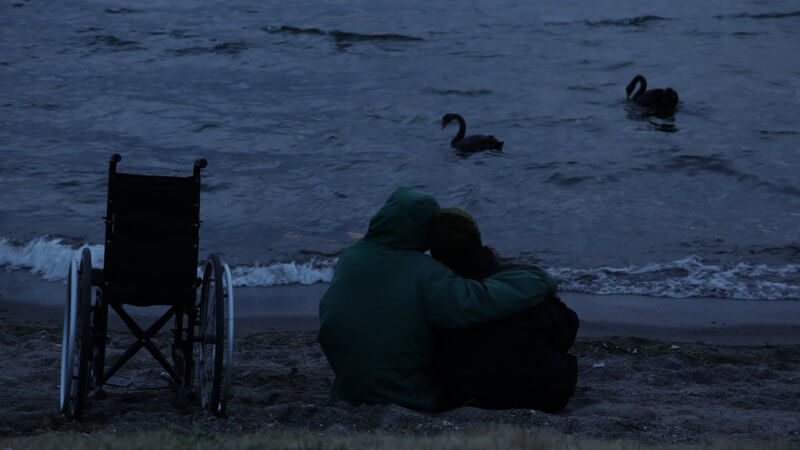David Lynch's Straight Story had, until very recently, the distinction of being the most peculiarly moving Road Movie I had ever seen. Featuring an elderly man on a cross-state voyage to see his ill brother who he had not spoken to for some time, the unexpectedly touching movie, featuring an array of bizarre characters along the way, remains one of Lynch's strongest. This journey, however was easily surpassed, in terms of miles traveled, joie de vivre and magical whimsy, by Marcel Barenna's wondrous film Little World.
A rather fantastical feature, Little World is a documentary detailing the 18'600 mile journey of a 20 year old from Barcelona who aims to navigate himself to the exact opposite end of the world from his home: a lighthouse found in East Cape, New Zealand. Although the voyage itself would constitute something remarkable, what makes this feat even more amazing is the fact that Albert Casals is a wheelchair user who aims to conduct the trip with no money. Instead, Casals aims to utilise only his street smarts and, hopefully, the kindness of strangers he meets along the way.
The movie unfolds with a real kindness of spirit as we see Albert traverse through Iran, Turkey, Malaysia, China and more on his epic journey yet, much more awe-inspiring to see than any of the great views of far away locations, is the personality of Albert himself; a wide-eyed, young at heart, inspirational man for whom there is no greater happiness to be found in life than simply living day-to-day and making friends across borders and language barriers.
It soon becomes clear that Albert is quite clearly a person of great substance and inspiration; a tragedy in his childhood left him with an inability to walk but, rather than use crutches or braces, the young Spaniard decided to use a wheelchair as his main method of transport as it was the one which would allow him to move with the same speed as his young friends. And, although his lack of mobility is of course a factor in his day to day life, he sees it as ultimately inconsequential. When people raise eyebrows at him dating an able-bodied lady his reaction is simply: "I don't believe something so banal should stop two people being together." He further states his wheelchair use is the equivalent of others wearing glasses; making a big deal out of this would be "silly".
The scope of the movie is humbling and many lessons are learned along the way both from how people react to Albert and the wisdom and values he leaves them with as he departs. Also, it's not hard to see where our hero gets his moral gravitas and world-view from: his Father tells the story of Albert's youth in which all kinds of tragedy struck but the stoic, unrelenting love he gave saw them both through. It was undoubtedly his inability to give up, his resolution to remain strong and begin each day with a smile in the face of adversity which helped his son grow up into the remarkable man he is today. The love Albert's father gave him multiplies further and further each day as the young Casals travels the world spreading his positivism, dignity and compassion across the globe; love is all he has known and it is this that inspires him to give it at every opportunity he can.
They say that travel expands the mind and in this case it is true; although I did not leave my cinema seat for the entire duration of the movie, the journey Albert took me on was one which helped me see the world much clearer. One of the most important lessons to be gleaned from the film comes from Casals' free-spirited words of delirious wisdom: "The World is so fucking cool!" With people like Albert Casals in it, I find that statement very hard to disagree with.
* This film was showing as part of Bradford International Film Festival


It's an amazing movie, a total masterpiece. Must-see.
Reply Delete